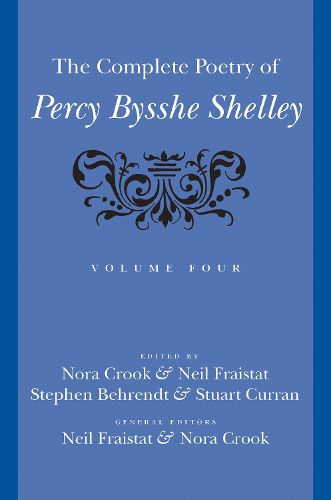Readings Newsletter
Become a Readings Member to make your shopping experience even easier.
Sign in or sign up for free!
You’re not far away from qualifying for FREE standard shipping within Australia
You’ve qualified for FREE standard shipping within Australia
The cart is loading…






The latest volume of the acclaimed and magisterial Hopkins Press edition of Percy Bysshe Shelley's poetry, covering the years 1818 to early 1820, the first phase of Shelley's Italian period.
"You talk Utopia," says the worldly Count Maddalo, reproaching the idealistic Julian in Julian and Maddalo. Inspired by conversations conducted on horseback near Venice between the two notorious exiled poets, Shelley and Byron, this poem was among the first of the masterpieces that Shelley wrote after moving with his family in March 1818 from England to post-Napoleonic Italy.
The fourth volume of the Hopkins Complete Poetry of Percy Bysshe Shelley covers the years 1818-19 and part of 1820, when Britain was convulsed by popular agitation for the reform of Parliament and stifled by repressive laws against free speech. Among its other contents are The Cenci, an indictment of tyranny, domestic and political, probably the most actable of Romantic dramas; The Mask of Anarchy, the "greatest poem of political protest ever written in English" (too inflammatory to be published at the time); Peter Bell the Third, a brilliant satire on Wordsworth; the fiery sonnet "England in 1819"; an eclogue for women's voices (Rosalind and Helen); playful, sophisticated songs ("Love's Philosophy") and sad verses ("Stanzas, Written in dejection"). Shelley's publications received slashing reviews from politically motivated critics, who attacked his character and principles but acknowledged his poetic gifts. He broadened his scope and composed the most politically engaged poems of his maturity. To quote a Victorian editor, he "ceased to be a subject of Time, and became a citizen of Eternity."
As in previous volumes, meticulously edited texts are accompanied by discussions of the poems' composition, the influences they reflect, their publication, reception, and critical history, and detailed records of textual variants. Appendixes range from Mary Shelley's editorial notes to jottings by Shelley drawn from a hitherto unrecognized source for The Cenci. Readers will find in volume four original research, fresh readings, new contexts, and discoveries-hallmarks of this acclaimed edition.
Volumes 5, 6, and 8 are in preparation.
$9.00 standard shipping within Australia
FREE standard shipping within Australia for orders over $100.00
Express & International shipping calculated at checkout
The latest volume of the acclaimed and magisterial Hopkins Press edition of Percy Bysshe Shelley's poetry, covering the years 1818 to early 1820, the first phase of Shelley's Italian period.
"You talk Utopia," says the worldly Count Maddalo, reproaching the idealistic Julian in Julian and Maddalo. Inspired by conversations conducted on horseback near Venice between the two notorious exiled poets, Shelley and Byron, this poem was among the first of the masterpieces that Shelley wrote after moving with his family in March 1818 from England to post-Napoleonic Italy.
The fourth volume of the Hopkins Complete Poetry of Percy Bysshe Shelley covers the years 1818-19 and part of 1820, when Britain was convulsed by popular agitation for the reform of Parliament and stifled by repressive laws against free speech. Among its other contents are The Cenci, an indictment of tyranny, domestic and political, probably the most actable of Romantic dramas; The Mask of Anarchy, the "greatest poem of political protest ever written in English" (too inflammatory to be published at the time); Peter Bell the Third, a brilliant satire on Wordsworth; the fiery sonnet "England in 1819"; an eclogue for women's voices (Rosalind and Helen); playful, sophisticated songs ("Love's Philosophy") and sad verses ("Stanzas, Written in dejection"). Shelley's publications received slashing reviews from politically motivated critics, who attacked his character and principles but acknowledged his poetic gifts. He broadened his scope and composed the most politically engaged poems of his maturity. To quote a Victorian editor, he "ceased to be a subject of Time, and became a citizen of Eternity."
As in previous volumes, meticulously edited texts are accompanied by discussions of the poems' composition, the influences they reflect, their publication, reception, and critical history, and detailed records of textual variants. Appendixes range from Mary Shelley's editorial notes to jottings by Shelley drawn from a hitherto unrecognized source for The Cenci. Readers will find in volume four original research, fresh readings, new contexts, and discoveries-hallmarks of this acclaimed edition.
Volumes 5, 6, and 8 are in preparation.